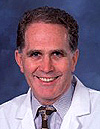Tuesday, March 1st
|

|
What Kind of Assistive
Technology Do You Need if You Break your Neck?
Graham H. Creasey, MD; Marc Samuels, MS, OTR/L,
CDRS; and Edward C. Brodd
VA Palo Alto Health
Care System |
This lecture will be held at the VA
Palo Alto Health Care System campus in the Spinal Cord Injury Service. The
class will convene in Building 7, Room E111 at 4:30pm. In addition to a tour of
the SCI facilities and a short lecture by Dr. Creasey, Marc Samuels will
demonstrate a driving simulator that assesses the driving ability of veterans
with brain injury and Ed Brodd will show a wheelchair-adapted
van.
Abstract: Breaking your neck can
affect nearly every part of your life. Physically, you may be paralyzed from
the neck down, with no feeling in the body, unable to control your bladder or
bowel or sexual function. Obviously, this affects you emotionally and socially
- your education, work, house, travel, and relationships. What can assistive
technology do to change this?
The industrial revolution gave us new tools,
special beds, mattresses, wheelchairs and cushions, catheters, implants, and
many other gadgets. The microelectronic industry has revolutionized
communication and control of equipment in the environment; if you can control a
computer, you can control many other things.
What about controlling paralyzed
muscles?
What about curing paralysis?
Biosketches: Graham Creasey is
the Paralyzed Veterans of America Professor of Spinal Cord Injury Medicine at
Stanford University and the Chief of Spinal Cord Injury Service at the VA Palo
Alto Health Care System. His research interests include the restoration of
function after spinal cord injury, using information technology, and
biotechnology.
Marc Samuels is an Occupational
Therapist and Certified Driving Rehabilitation Specialist at the VA Palo Alto
Health Care System. He currently treats individuals with a wide variety of
diagnosis including traumatic brain injuries (TBI), spinal cord injuries (SCI),
amputations, dementia, strokes (CVA), post traumatic stress disorders (PTSD),
orthopedic injuries, psychiatric diagnosis, and/or vision/perceptual
impairments. Marc maintains professional certifications in Physical Agent
Modalities, Neuro-Developmental Treatment (NDT), and as a Workplace Dispute
Resolution Mediator, Nationally Certified Mentor, and Certified Driving
Specialist. Current affiliations include Association for Driver Rehabilitation
Specialists (ADED), National Mobility
Equipment Dealers Association (NMEDA),
American Occupational Therapy Association (AOTA), and Occupational Therapy Association of
California (OTAC).
Edward C. Brodd received his Masters
Degree in Health Science from San Jose State University in 1980. He has been
employed at the Department of Veterans Affairs since 1981, working in
Department of Physical Medicine and Rehabilitation, primarily in the spinal
cord injury unit as a kinesiotherapist. In 1983, he became Program Manager of
the Driver Evaluation Program, evaluating disabled veterans' ability to return
to independent driving. In 1990, he was certified as a Driver Rehabilitation
Specialist through the Association of Driver Rehabilitation Specialists and
Department of Veterans Affairs. In 2005, he co-authored a study titled:
Predictive Validity of Driving-Simulator Assessments following Traumatic
Brain Injury: A Preliminary Study. He currently teaches the annual VA
Central Office VA Prosthetic course on the Driver Evaluation Program to
prospective prosthetic program specialists. He is an adaptive equipment expert
prescribing and training veterans with various driving adaptive equipment,
including mechanical hand controls, sensitized steering systems, and
computer-based hand controls.
- Contact information:
- VA Palo Alto Health Care
System
- Spinal Cord Injury Service
- 3801 Miranda Ave.
- Room C115, Building 7
- Palo Alto, CA 94304
- gcreasey -at- stanford.edu
- marc.samuels -at- va.gov
- ed.brodd -at- va.gov
- Lecture Material:
- Directions to the
class - 123 Kb pdf file
- Patient
Mover
- Audio -
1:26:01 - 19.6 Mb mp3 file
- Kodak
Gallery photos - 21 photos
- Links:
- Stanford School of
Medicine Academic Profile
- New program for
spinal injuries
|
